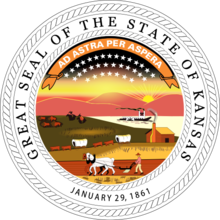Withdrawn Anti-Obama Kansas Ballot Challenge Continues Major Party Ballot Access Streak
It has been 48 years since a major party presidential nominee failed to appear on the ballot in every state

Late last week, the state’s Objections Board heard a challenge from a Kansas resident, Joe Montgomery, who petitioned Obama’s name be removed alleging the president did not meet citizenship requirements to hold the office.
The Board was set to rule Monday on the challenge after requesting additional information on Obama’s birth certificate from the State of Hawaii, but Montgomery withdrew his challenge over the weekend thus ensuring the president’s name will indeed be on the ballot.
(The Objections Board is comprised of three top elected Republican officials: Lieutenant Governor Jeff Colyer, Secretary of State Kris Kobach, and Attorney General Derek Schmidt).
Kansas, of course, has been one of the most reliably Republican states in the nation – supporting the GOP presidential nominee in 20 of the last 23 cycles since 1920, failing to do so only during the Democratic landslide elections of 1932, 1936, and 1964.
But in the unlikely event Obama’s name had been removed from the Kansas ballot, it would mark an end to the longest streak in U.S. history in which major party candidates received ballot access across all states in the union.
The last time a major party presidential nominee failed to appear on the ballot in every state was 1964, with Lyndon Johnson in the State of Alabama.
Instead of backing the national nominee for the party, Alabama – governed then by the anti-civil rights conservative Democrat George Wallace – offered a slate of unpledged Democratic electors, which netted 30.6 percent of the vote for the Party in one of the six states carried by Republican nominee Barry Goldwater.
Fourteen years prior, Alabama was also the second to last state in which a major political party presidential nominee did not appear on the general election ballot.
In 1948, State’s Rights Democrat Strom Thurmond received the party’s slot in that year’s presidential contest in the Yellowhammer State – carrying it that November along with Louisiana, Mississippi, and South Carolina (Truman appeared on the ballot in these three states, having to file as an independent in Louisiana and Mississippi).
Prior to 1948, it had been 36 years since the last time a major candidate failed to earn a spot on each ballot across the country.
In 1912, incumbent Republican president William Howard Taft failed in his attempt to get on the ballot in two states – California and South Dakota – whose slate of GOP electors backed the former Rough Rider Teddy Roosevelt for president.
Running nationally under the Progressive Party banner, Roosevelt appeared on the ballot in 47 of the 48 states – losing a court appeal in Oklahoma.
In 1892, incumbent Republican President Benjamin Harrison was not on the ballot in Florida, while ex-Democratic President Grover Cleveland failed to do so in Colorado, Idaho, Kansas, North Dakota, and Wyoming.
Prior to 1888, ballots were not issued by the government and in most states political parties printed their own ballots with a list of their endorsed candidates.
As a result, many national presidential nominees were not ‘on the ballot’ across several states in the 1800s.
For example, in 1832, the Whig Party failed in their attempt to send the presidential election to the House of Representatives by backing regional nominees against Martin Van Buren, in the hopes the Democrat would not receive a majority of Electoral College votes.
Whig William Harrison carried Delaware, Kentucky, Indiana, Maryland, New Jersey, Ohio, and Vermont, Daniel Webster carried Massachusetts, and the party’s southern candidate, Hugh White, carried Georgia and Tennessee.
In 1856, the newly formed Republican Party did not find its nominee, John Frémont, on the ballot in a dozen southern states: Alabama, Arkansas, Florida, Georgia, Kentucky, Louisiana, Mississippi, Missouri, North Carolina, Tennessee, Texas, and Virginia.
In each of those states, the choice was between Democrat James Buchanan and American Party nominee and former president Millard Fillmore.
In 1860, each of the four candidates receiving Electoral College votes did not compete in at least one state: Republican Abraham Lincoln in nine southern states (Alabama, Arkansas, Florida, Georgia, Louisiana, Mississippi, North Carolina, Tennessee, Texas), Democrat Stephen Douglas in one (Texas), Southern Democrat John Breckinridge in three (New Jersey, New York, Rhode Island), and Constitutional Union nominee John Bell in four (Minnesota, New Jersey, New York, Rhode Island).
Follow Smart Politics on Twitter.
